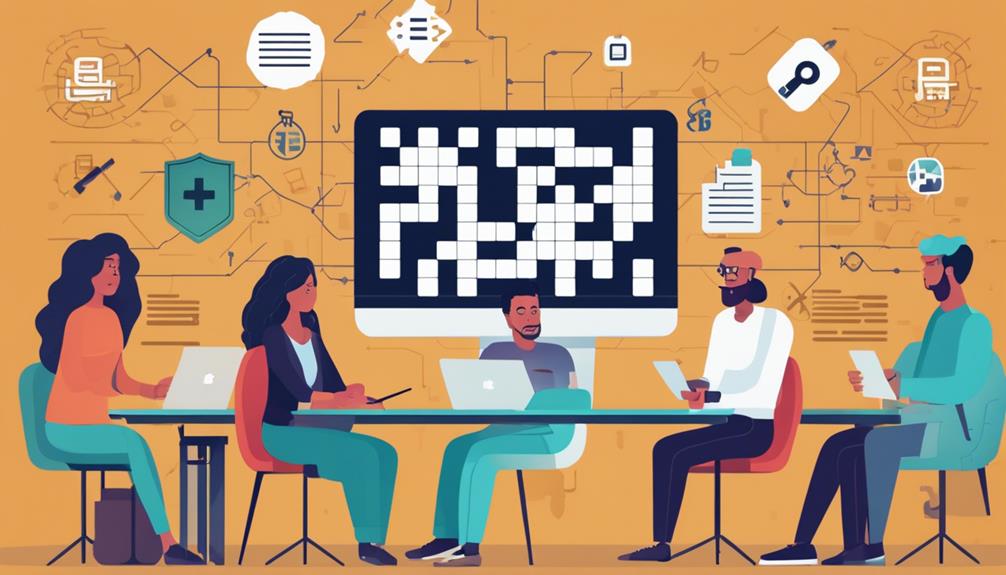If you're puzzled by the 'Computer Security Concern Crossword Clue,' you might be dealing with hidden digital dangers. Watch for strange signs like pop-ups or sudden system changes. Malware, phishing, and ransomware are common threats you should guard against. Encryption shields your data from prying eyes, while strong passwords and firewalls act as barriers to keep your information safe. There's more to uncover about safeguarding your digital world in the tips provided.
Key Takeaways
- Ransomware, phishing, and malware are common computer security concerns.
- Encryption protects data from cyber threats by converting it into a code.
- Strong, unique passwords and multi-factor authentication enhance security.
- Firewalls monitor and control network traffic to prevent unauthorized access.
- Regularly updating passwords and using reputable antivirus software is crucial for defense.
Understanding the Clue

To better understand the clue, start by analyzing the suspicious activity on your computer. Interpreting clues in the digital domain is similar to solving puzzles. Look for any unusual pop-ups, unexpected slowdowns, or unfamiliar programs running in the background. These could be indicators of a cybersecurity threat.
When solving puzzles related to computer security, pay attention to any sudden changes in your system settings or permissions. Hackers often try to gain unauthorized access by manipulating these settings.
Additionally, keep an eye out for any unknown files or folders that may have been stealthily downloaded onto your device.
Another important aspect of interpreting clues in cybersecurity is monitoring your network activity. Check for any unusual outgoing traffic or connections to unfamiliar IP addresses. These could signify a breach or an ongoing cyber-attack.
Common Cyber Threats
Common cyber threats include malware, phishing, and ransomware attacks that can compromise your computer security.
Phishing scams are deceptive attempts by cybercriminals to trick individuals into revealing sensitive information such as passwords, credit card numbers, or personal details. These scams often involve emails or messages that appear to be from legitimate sources but are designed to steal your data through social engineering tactics.
Ransomware attacks are another prevalent threat where malicious software encrypts your files, demanding payment for their release.
Social engineering tactics are manipulative strategies used by hackers to exploit human psychology and gain access to confidential information.
Data breaches are incidents where sensitive data is accessed or disclosed without authorization, putting individuals at risk of identity theft and financial harm.
It's important to stay vigilant and implement cybersecurity measures to protect yourself from these common cyber threats. Regularly updating your security software and being cautious of suspicious emails or links can help safeguard your digital information.
Importance of Encryption

Encryption plays an essential role in safeguarding your data from cyber threats, ensuring that sensitive information remains secure and protected. By converting data into a code that can only be deciphered with the right encryption key, encryption serves as an indispensable layer of defense against unauthorized access.
One of the key benefits of encryption is its ability to prevent hackers from intercepting and reading your data as it travels across networks or is stored on devices. This process is pivotal in data protection as it shields your information from being compromised, especially in scenarios where data is transmitted over the internet.
Moreover, encryption helps maintain the confidentiality and integrity of your data, making sure that only authorized individuals can access and modify it. This not only secures your personal information but also safeguards sensitive business data from falling into the wrong hands.
In today's digital age, where cyber threats are rampant, incorporating encryption into your security practices is paramount to maintaining the privacy and security of your data.
Types of Malware
Have you ever wondered about the various types of malware that pose a threat to your computer security? Ransomware attacks are one of the most prevalent forms of malware today. These malicious software programs encrypt your files and demand a ransom to restore access. It's vital to have robust backup systems in place to mitigate the impact of such attacks.
Another common type of malware is the Trojan horse. These deceptive programs appear harmless but contain malicious code that can steal your personal information or give hackers access to your system. Detecting Trojan horses can be challenging since they often masquerade as legitimate software. Using reputable antivirus software and being cautious of suspicious email attachments or links can help prevent Trojan infections.
Being aware of the different types of malware, such as ransomware and Trojan horses, is important in safeguarding your computer security.
Stay vigilant, keep your software updated, and practice safe browsing habits to reduce the risk of falling victim to these malicious programs.
Secure Password Practices

Guarantee that your passwords are strong and unique to enhance your overall computer security. When creating passwords, make sure they're complex, incorporating a mix of letters, numbers, and special characters.
Avoid using easily guessable information like birthdates or pet names. Password strength is vital in safeguarding your accounts against unauthorized access.
Additionally, consider utilizing multi-factor authentication (MFA) for an extra layer of protection. MFA requires not only a password but also another form of verification, such as a fingerprint scan or a unique code sent to your phone. This greatly reduces the risk of a security breach even if your password is compromised.
Regularly updating your passwords and refraining from using the same one across multiple accounts is essential. Strengthening your password practices and implementing MFA can fortify your defenses against cyber threats and enhance your overall digital security.
Role of Firewalls
Firewalls play an essential role in protecting your computer system from unauthorized access and potential cyber threats. These security barriers monitor and control incoming and outgoing network traffic based on predetermined security rules. By doing so, firewalls act as a safeguard against malicious attacks and unauthorized intrusions.
Firewall functionality includes inspecting network packets to determine whether to allow or block them based on the established rules. They create a barrier between your internal network and the internet, filtering data to prevent harmful information from entering your system.
Network protection is a key aspect of firewall implementation. By setting up a firewall, you establish a secure perimeter that acts as the first line of defense against cyber threats. It helps prevent unauthorized access to your network, keeping your data safe from potential breaches.
Best Practices for Online Safety

To enhance your overall computer security, implementing best practices for online safety is paramount. When it comes to online privacy tips, make sure to use strong, unique passwords for each account and enable two-factor authentication whenever possible.
Additionally, regularly update your software and be cautious of phishing emails that may try to steal your personal information.
For cybersecurity tips, consider using a reputable antivirus program and a virtual private network (VPN) to encrypt your internet connection and protect your data. Be mindful of the websites you visit and only download software from trusted sources to avoid malware infections.
When it comes to social media safety, review your privacy settings regularly and be cautious about the information you share online. Avoid posting sensitive data such as your home address or phone number to protect yourself from potential threats.
Lastly, implement data protection measures such as backing up your important files regularly and using encryption tools to secure your sensitive data. By following these best practices for online safety, you can greatly reduce the risk of falling victim to cyber threats.
Conclusion
Overall, staying vigilant and proactive about computer security concerns is essential in today's digital world.
By understanding common cyber threats, utilizing encryption, practicing secure password habits, and implementing firewalls, you can greatly reduce the risk of falling victim to malicious attacks.
Remember to always stay informed and follow best practices for online safety to protect yourself and your sensitive information from potential threats.
Stay safe and secure online!




